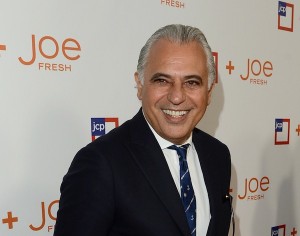Soft-spoken, reserved, thoughtful. Hardly the epitome of a dragon. Yet, Joe Mimran’s definitely a dragon – one of the newest on the panel of investors on Dragons’ Den, CBC’s hit entrepreneur reality show.
The Canadian fashion designer, clothier and entrepreneur is best known for launching the Club Monaco and Joe Fresh brands. He is also a partner in Gibraltar Ventures, investing in early-stage digital businesses.

The 63-year-old, Moroccan-born immigrant has spent nearly his entire life immersed in business, in ventures on his own or with family members, particularly in the clothing industry.
At an early age, he assisted his mother, Esther – who was a couturier in Morocco – in her Toronto-based boutique garment outlet. That business grew, necessitating the purchase of a small factory in Toronto’s garment district in the mid-1970s. Mimran joined to lead operations, manufacturing and finance.
“I was inspired by the design and esthetic world,” he said. “I like designing products, building stores.” He was “inspired by great prints, inspired to want to be entrepreneur.”
That inspiration evolved into Ms. Originals, tailoring suits and pants for women and, soon thereafter, Mimran and brother Saul hired designer Alfred Sung, with a goal to create their own clothing line. The Alfred Sung collection swiftly soared in popularity across the continent.
By the mid-1980s, he launched yet another line, based on the idea that a plain, white, quality cotton shirt was unavailable in the market – and Club Monaco brand was born.
“If you’re not a risk taker and abhor taking risks, entrepreneurship is not for you,” said Mimran.
“There were many people along the way of my career who said, ‘You’re crazy, don’t do this or don’t do that. What do you waste your time for doing that?’ I have stuck to my guns. Sometimes you need to say to naysayers that you have to pursue your dream.”
Unfortunately, the plan didn’t go smoothly at first. The Bay and Eaton’s didn’t want to carry the product.
“We realized that we had all these goods coming in and the only way we could move forward was to open our own stores,” he said.
They rolled the dice on a 5,000-square-foot store in trendy Queen Street West in Toronto, showcasing an array of attire. The day it opened in September 1985 saw their marketing campaign pay off in a major way, with line-ups to get into the store.
“From adversity comes something terrific,” said Mimran. “We realized, as we opened our own stores, we’ll cut out the wholesale margin.”
At the time, such a move was rare. Typically, retail stores bought through a wholesaler, he explained. “But, sometimes, you just have to dive in, make the mistakes, fix it, move forward, make more mistakes, and try different things.”
Mimran dived in, not only opening a flagship Club Monaco store in New York City on Fifth Avenue in 1995, but opening another 120 stores in the next four years. That success caught the eye of Polo Ralph Lauren Corp., who purchased both Club Monaco and Caban (another Mimran line) in 1999.
“A lot of businesspeople, having had lots of problems in the past, will try to dissuade somebody else,” said Mimran. “But your idea might be done in a new way, might resonate in a way that this very experienced person didn’t, couldn’t, anticipate. There’s always an idea that surprises people, and that leads to success.”
Mimran has continued that success, time and again.
Pink Tartan – a women’s line – was yet another Mimran venture, appearing in high-end retail outlets such as Holt Renfrew and Saks Fifth Avenue, as well as in its flagship store in Toronto’s Yorkville.
Mimran’s Joe Fresh Style, a private-label apparel line for Loblaw Companies Ltd., was launched in 2006. The label has since opened free-standing stores – the first Joe Fresh opened on Granville Street in Vancouver in 2010 and, soon thereafter, in New York City. Many others followed.
Mimran said the apparel industry is among the most competitive industries in the world. Because of this fact and his own experiences, he empathizes with the entrepreneurs who come to the Den having had tough breaks.
“No matter how good you are, or what you know, you can still fail in our business,” he said. “It keeps you pretty grounded.”
Today, Mimran sees a future of entrepreneurs that have opportunities that were nonexistent a generation ago.
“There’s more willingness to try by the new generation – millennials – who are asset light, where boundaries and borders are not an issue. They live in a virtual world and have the ability to take on more risk. They look at the world in a dynamic way that leads to entrepreneurship,” he explained. “Particularly in today’s world, where things are so different in terms of how one communicates with the consumer, all the new online fundraising channels that are available, what’s old is new, what’s new is old. It’s the Wild West out there.”
Dave Gordon is a Toronto-based freelance writer whose work can be found in more than 100 publications globally. His is managing editor of landmarkreport.com.
